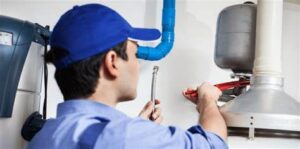▷5 Tips To Repair Your Water Heater In San Diego
5 Tips To Repair Your Water Heater In San Diego
A malfunctioning water heater can be a major inconvenience, disrupting your daily routine and causing frustration. Whether it’s lukewarm water, strange noises, or a complete lack of hot water, addressing the issue promptly is essential. While some problems may require professional assistance, there are several troubleshooting steps you can take to repair your water heater yourself. Here are five tips to help you get your hot water flowing again:
Check the Power Supply
Before diving into complex troubleshooting, ensure that your water heater is receiving power. Sometimes, a tripped circuit breaker or a blown fuse could be the culprit behind the malfunction. Locate your water heater’s circuit breaker in the electrical panel and check if it has tripped. If so, reset it and observe if the heater begins to function normally. Additionally, inspect the power cord for any signs of damage or loose connections.
Flush the Tank
Sediment buildup inside the tank is a common issue that can reduce the efficiency of your water heater and lead to various problems. Over time, minerals and debris accumulate at the bottom of the tank, hindering heat transfer and causing overheating. Flushing the tank annually can help prevent these issues and prolong the lifespan of your water heater. To flush the tank, turn off the power and water supply to the heater, connect a garden hose to the drain valve, and open the valve to drain the tank completely. Once drained, close the valve, refill the tank, and restore power to the heater.
Inspect the Heating Elements
If you’re experiencing inadequate hot water or no hot water at all, faulty heating elements could be to blame. Electric water heaters typically have two heating elements – one at the top and one at the bottom of the tank. Using a multimeter, you can test the continuity of these elements to determine if they are functioning correctly. If either element is faulty, it will need to be replaced. Remember to turn off the power to the water heater before attempting any repairs on the heating elements.
Check the Thermostat Settings
Incorrect thermostat settings can result in water that is either too hot or not hot enough. Make sure to check the temperature settings on your water heater’s thermostat and adjust them as needed. The recommended temperature for most households is between 120 to 140 degrees Fahrenheit (49 to 60 degrees Celsius). Setting the thermostat too high not only wastes energy but also increases the risk of scalding. If your water heater has separate thermostats for upper and lower heating elements, ensure that both are set to the same temperature.
Inspect for Leaks
Water leaks around the water heater can indicate a variety of issues, from loose fittings to corroded tanks. Inspect the area around your water heater for any signs of moisture or puddles. Check the pressure relief valve, inlet and outlet connections, and the tank itself for leaks. Tighten any loose fittings and replace damaged components promptly to prevent further water damage.
FAQs
How Often Should I Flush My Water Heater?
It’s recommended to flush your water heater at least once a year to remove sediment buildup and maintain its efficiency.
Why Is My Water Heater Making Strange Noises?
Strange noises such as rumbling or popping sounds are often caused by sediment buildup inside the tank, which interferes with the heating process.
What Should I Do If I Smell Gas Near My Water Heater?
If you detect a gas odor near your water heater, immediately turn off the gas supply, open windows for ventilation, and contact a professional plumber or gas company for assistance.
Conclusion
In conclusion, troubleshooting and repairing a water heater can often be done without the need for professional help, saving you time and money. By following these five tips and staying informed about common issues, you can keep your water heater running smoothly and enjoy uninterrupted access to hot water in your home. Remember to prioritize safety and consult a professional for any repairs beyond your expertise.
Give Home Pro Plumbing a call right away to learn more about how our experts can help with leak detection in San Diego, CA.
Our Plumbing & Leak Detection Services
Related Posts

▷5 Benefits of Hydro Jet Plumbing: A Comprehensive Guide In San Diego
5 Benefits of Hydro Jet Plumbing: A Comprehensive Guide In San Diego Hydrojet plumbing is a…

▷Essential Tips for Installing a Heat Pump Water Heater In San Diego
Essential Tips for Installing a Heat Pump Water Heater In San Diego Did you know…

